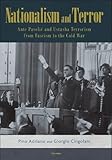Nationalism and terror : Ante Pavelic and Ustashe terrorism from fascism to the Cold War / Pino Adriano and Giorgio Cingolani ; translated by Riccardo James Vargiu.
Material type: TextLanguage: English Original language: Italian Publication details: Budapest ; New York : Central European University Press, (c)2018.Description: 1 online resource (458 pages) : illustrationsContent type:
TextLanguage: English Original language: Italian Publication details: Budapest ; New York : Central European University Press, (c)2018.Description: 1 online resource (458 pages) : illustrationsContent type: - text
- computer
- online resource
- 9789633862070
- 9633862078
- Ante Pavelic and Ustashe terrorism from fascism to the Cold War
- DR1586 .N385 2018
- COPYRIGHT NOT covered - Click this link to request copyright permission: https://lib.ciu.edu/copyright-request-form
| Item type | Current library | Collection | Call number | URL | Status | Date due | Barcode | |
|---|---|---|---|---|---|---|---|---|
 Online Book (LOGIN USING YOUR MY CIU LOGIN AND PASSWORD)
Online Book (LOGIN USING YOUR MY CIU LOGIN AND PASSWORD)
|
G. Allen Fleece Library ONLINE | Non-fiction | DR1586 (Browse shelf(Opens below)) | Link to resource | Available | on1011548148 |
Includes bibliographies and index.
The Ustashe movement from its origins to 1941 -- Origins -- The kingdom of Serbs, Croats, and Slovenes and Italy -- Under the Duce's wing -- The regicide -- From Turin to Zagreb -- The Ustashe in power, 1941-45 -- The independent state of Croatia -- The massacres of Serbs, Jews, and rRomani -- Survival problems for the independent state -- Crisis and the end of the Croatian state -- The Ustashe and the Cold War, 1945-59 -- War criminals on the run -- Camps and monasteries: the Ustashe return to italy -- The anticommunist crusade -- Toward the New World -- The Ustashe in Argentina -- Epilogue: The question of the Ustashe between Yugoslavia and the Vatican, 1952-72.
This book covers the full story of the Ustasha, a fascist movement in Croatia, from its historic roots up to its downfall. The two authors sought answers to questions that touch the heart of the issue: In what international context did Ustasha terrorism grow and develop? How could the movement settle to power and exterminate hundreds of thousands of innocents? Who was its leader, Ante Pavelić? A shrewd politician, able to exploit for his independent project Mussolini's imperial ambitions, Hitler's panGerman aims, the antiBolshevism of the Holy See and of the Western bloc? Or was he, consciousl.
COPYRIGHT NOT covered - Click this link to request copyright permission:
There are no comments on this title.
